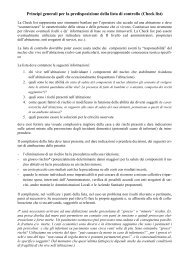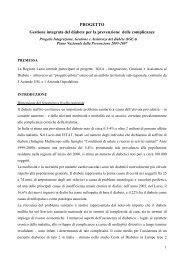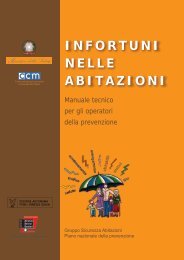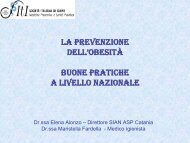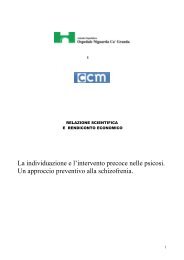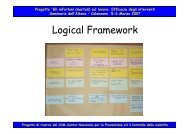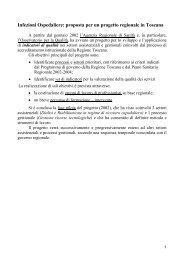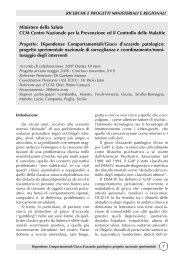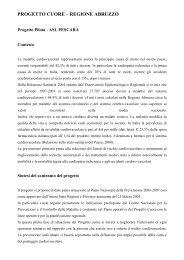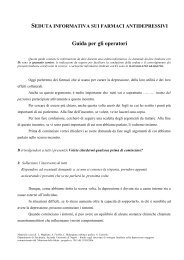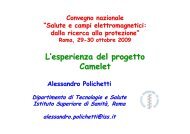Gaining health : analysis of policy development in European ...
Gaining health : analysis of policy development in European ...
Gaining health : analysis of policy development in European ...
Create successful ePaper yourself
Turn your PDF publications into a flip-book with our unique Google optimized e-Paper software.
Chapter 4<br />
66<br />
plann<strong>in</strong>g philosophy and culture conducive to <strong>in</strong>tersectoral<br />
action for <strong>health</strong> promotion based on pr<strong>in</strong>ciples <strong>of</strong> equality<br />
and solidarity.<br />
F<strong>in</strong>land has a highly educated and motivated population, not<br />
only <strong>in</strong> the sense <strong>of</strong> formal education but <strong>in</strong> their cont<strong>in</strong>ued<br />
search for <strong>in</strong>formation. A high proportion <strong>of</strong> F<strong>in</strong>ns read<br />
newspapers and the nationwide network <strong>of</strong> libraries is<br />
one <strong>of</strong> the densest <strong>in</strong> the world and is well used, with 12.5<br />
visits per resident each year (64). The public is accept<strong>in</strong>g <strong>of</strong><br />
reasoned argument and expert op<strong>in</strong>ion.<br />
Investment <strong>in</strong> research and <strong>development</strong> is a def<strong>in</strong><strong>in</strong>g characteristic<br />
<strong>of</strong> the F<strong>in</strong>nish economy, and is reflected <strong>in</strong> tackl<strong>in</strong>g<br />
NCD. The strong culture <strong>of</strong> monitor<strong>in</strong>g <strong>health</strong> status and<br />
evaluat<strong>in</strong>g the impact <strong>of</strong> <strong>in</strong>terventions for <strong>health</strong> promotion<br />
has meant that the evidence for disease prevention and<br />
<strong>health</strong> promotion has frequently been ahead <strong>of</strong> the actual<br />
action. It has also meant, however, that public op<strong>in</strong>ion has<br />
been prepared. For example, public op<strong>in</strong>ion supported antismok<strong>in</strong>g<br />
measures and allowed radical anti-smok<strong>in</strong>g legislation<br />
to be <strong>in</strong>troduced as early as 1976. Consensus-based<br />
action has also been important <strong>in</strong> the workplace.<br />
Over the years, this practice <strong>of</strong> evidence-based decisionmak<strong>in</strong>g<br />
has meant that the knowledge base has been cont<strong>in</strong>uously<br />
built up and improved. Information is accessible<br />
and available <strong>in</strong> forms that are easy to use. Young experts<br />
<strong>in</strong>volved <strong>in</strong> this type <strong>of</strong> work are tra<strong>in</strong>ed for work<strong>in</strong>g outside<br />
the medical model.<br />
The use <strong>of</strong> regular public <strong>health</strong> reports <strong>in</strong> rais<strong>in</strong>g awareness,<br />
follow<strong>in</strong>g progress <strong>in</strong> <strong>policy</strong> implementation and<br />
prepar<strong>in</strong>g the path for <strong>policy</strong> revision, has been extremely<br />
effective. Such reports have gradually evolved so that now<br />
all sectors must account for their actions to promote <strong>health</strong>.<br />
Work on HIA, <strong>in</strong> comb<strong>in</strong>ation with other types <strong>of</strong> social and<br />
human impact assessment, is still at an early stage but opens<br />
the way for mak<strong>in</strong>g actors across sectors more aware <strong>of</strong> the<br />
importance <strong>of</strong> public <strong>health</strong> for overall <strong>development</strong>.<br />
The very long history <strong>of</strong> occupational <strong>health</strong> <strong>in</strong> F<strong>in</strong>land, and<br />
the legal responsibility <strong>of</strong> both public and private enterprises,<br />
sensitizes the private sector to <strong>health</strong> promotion to<br />
some extent. It rema<strong>in</strong>s for this to be further broadened to<br />
focus more strongly on tackl<strong>in</strong>g NCD.<br />
NGOs related to the ma<strong>in</strong> NCD and their risk factors have<br />
been active <strong>in</strong> F<strong>in</strong>land for many years. Their membership<br />
<strong>in</strong>cludes top experts <strong>in</strong> the field <strong>of</strong> NCD. Their knowledge<br />
is valued and utilized by the public sector <strong>in</strong> formulat<strong>in</strong>g and<br />
implement<strong>in</strong>g <strong>health</strong> policies.<br />
Notable successes have been achieved, particularly <strong>in</strong> relation<br />
to smok<strong>in</strong>g, nutrition and the reduction <strong>of</strong> CVD, show<strong>in</strong>g<br />
that it can be done and encourag<strong>in</strong>g further attempts<br />
at <strong>health</strong> promotion. Certa<strong>in</strong> aspects <strong>of</strong> F<strong>in</strong>nish life and<br />
attitudes facilitate mak<strong>in</strong>g the <strong>health</strong>y choice. For example,<br />
mass cater<strong>in</strong>g rema<strong>in</strong>s a useful po<strong>in</strong>t <strong>of</strong> <strong>in</strong>tervention, s<strong>in</strong>ce<br />
a large proportion <strong>of</strong> children and adults eat at their place<br />
<strong>of</strong> education or work. F<strong>in</strong>land is a forerunner <strong>in</strong> produc<strong>in</strong>g<br />
functional foods, with some <strong>of</strong> its products <strong>in</strong> global demand.<br />
Physical activity is an important part <strong>of</strong> leisure time –<br />
approximately 40% <strong>of</strong> 10–18-year-olds participate <strong>in</strong> sports<br />
club activities, for example.<br />
F<strong>in</strong>nish experts have for many years been closely <strong>in</strong>volved <strong>in</strong><br />
WHO and more recently EU networks. Through these <strong>in</strong>ternational<br />
networks and national efforts such as the North<br />
Karelia Project, an attempt has been made to balance medical<br />
knowledge with social and behavioural theory. Opportunities<br />
have been taken to share experience and know-how<br />
with other countries at an early stage <strong>of</strong> <strong>in</strong>novation.<br />
There is a clear recognition <strong>of</strong> the <strong>in</strong>fluence and possible<br />
threats <strong>of</strong> <strong>European</strong> and global <strong>policy</strong> on national NCD<br />
<strong>policy</strong>. An explicit attempt is made to <strong>in</strong>fluence <strong>European</strong><br />
Case studies: <strong>policy</strong> <strong>development</strong> <strong>in</strong> countries for tackl<strong>in</strong>g noncommunicable diseases



